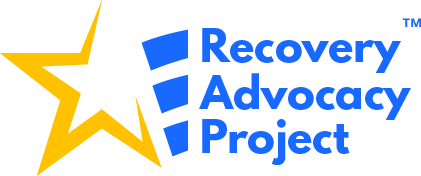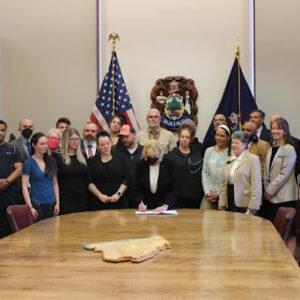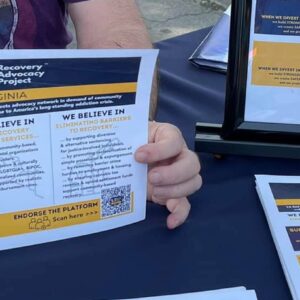Kim Benefield has spent two decades in the field of recovery advocacy in Mississippi, a state where more than half of the communities are rural and medically underserved. The rural nature contributes to an inequitable distribution of resources and impacts the level of health of its residents – this is especially true for Substance Use Disorder (SUD), recovery services and supports. Considering these factors, the Mississippi chapter of Recovery Advocacy Project (RAP) has a full agenda for 2022.
Benefield is the Executive Director of Southern Recovery Advocacy, the only recovery center in Mississippi. The center receives no funding, yet advocates like Benefield ensure the doors stay open and recovery support services are offered. “We’ve got to help these people!” Benefield said. Services offered at the center include assessments, recovery support and connections to free mental health care and therapists.
She credits her passion for advocacy partly to the RAP community. “I believe in the project, it helps us to have a voice we normally didn’t have.” Benefield explains that leaders and advocates knew things had to change, but they didn’t know how to mobilize and take action. “RAP gives us guidelines and everything we need.” There is power in numbers, and she is grateful to work with other Mississippi RAP leaders and even other RAP organizations around the country. “Single handed we can’t do it, it doesn’t work,” Benefield explains. “We need a solid group advocating for a cause.”
The Mississippi RAP platform includes 1. Reducing Stigma around SUD, recovery and harm reduction, 2. Access to Recovery Support and 3. Housing. In late February, MS RAP held a public Town Hall and other similar events are in the works. The group recently attended Recovery Day at the state capitol in Jackson and are currently working on a Summit in Tupelo to help educate the community. Also, in partnership with Mississippi Harm Reduction initiative, state RAP leaders are working to pass legislation that would allow distribution of life-saving supplies such as fentanyl testing strips and syringe services. They have also created a petition to stop the Department of Mental Health from defunding peer support. Lastly, RAP leaders are actively working to create more safe and affordable recovery housing.
Two other integral members of Mississippi RAP are Cassandra James Weathersby and Angela Mallette.
Weathersby is the founder of Black Women Do Heal, and she is also a mental health advocate and champion for women’s healing. A professional and personal mission of Weathersby is to break stigma to help women heal and live their best lives, especially within the Black community.
“In our community, there is stigma within the stigma,” she explains. “In the black community, there is even more stigma because we don’t do that. We don’t get that help or talk to therapists; it’s thought that those are white people’s problems. And the reality is, those are our problems. Those are human problems.”
Weathersby explains that stigma around these sensitive topics can create a cycle where a person feels they can’t talk to professionals or leaders for fear of being judged. There is a shame associated with having a mental health or SUD issue, which prevents them from getting the healthcare that is already extremely limited in Mississippi. “Especially black women. We’re supposed to be stronger than that – a strength we didn’t ask for.”
Weathersby believes that a small step to overcoming stigma is by having conversations with others and telling their stories.
Angela Mallette is the Director of Outreach for End it For Good, an organization that strives to help children, families, and communities thrive and advocates for approaches to drugs that prioritize life and the opportunity to thrive. For Mallette, she feels that harm reduction is the way to prioritize life and allow folks to live their best life.
“I feel like harm reduction is the future for recovery. I think that it is the future of what recovery goals need to look like for people and what our policies need to look like. And those are not my words – they are Maia Szalavitz’s words,” she said with a smile, speaking about the author who penned many books including Undoing Drugs and Unbroken Brain.
Mallette has made it a priority to reform all the areas harming people and not helping them. “Each way a stakeholder can practice harm reduction,” she explained. “No matter where you are in the game, you can make a difference.”
The Mississippi RAP team meets every other Wednesday at 12:30pm CST over Zoom. For more information, please contact Kim Benefield at kim.benefield@ southernrecoveryadvocacy.org.



